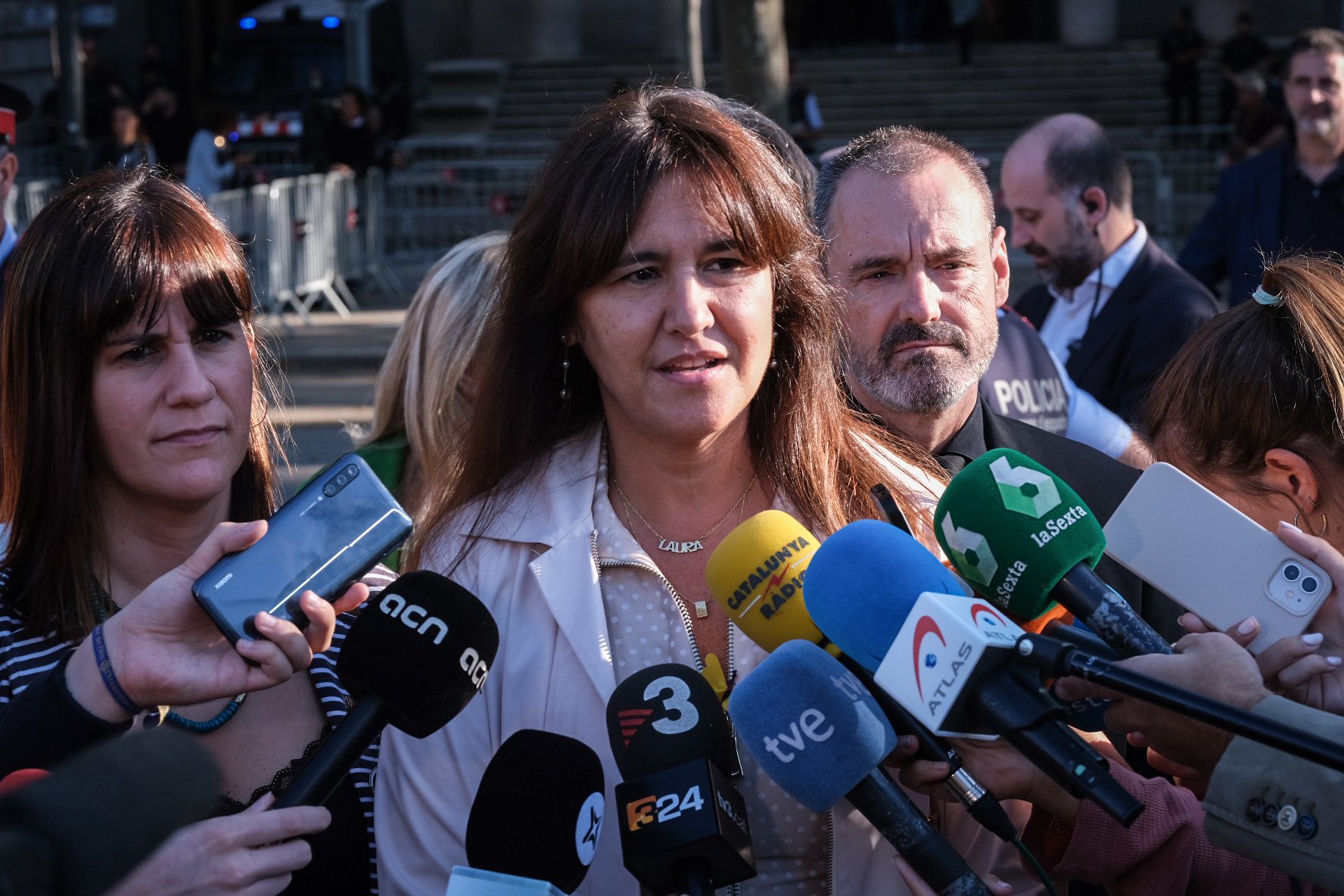A key expert report produced by the defence - which has prompted a counterattack from the prosecution. The suspended speaker of the Catalan Parliament, also president of Junts, Laura Borràs, has provided the Catalan High Court (TSJC) with expert technological evidence affirming that the emails intercepted by the Mossos d'Esquadra police from Isaías Herrero, which are the prosecution's main evidence in the Institute of Catalan Letters (ILC) contracts case "do not have judicial approval". In other words, they should be expelled from the court case, in which Borràs is accused of having improperly awarded 18 small contracts to Herrero to create the public cultural institution's website. However, following the completion of the expert report, the digital newspaper Eldiario.es reported this Thursday that the prosecutor has questioned one of the two experts, Luis Enrique Hellín, for being the ultra-right gunman who killed Yolanda González in Madrid in 1980, and has asked the TSJC to remove him from the process, as a senior Catalonia public prosecutor confirmed, without wanting to name the person because he is not part of the procedure. Borràs's lawyer, Gonzalo Boye, reacted in a tweet, clarifying that the experts were chosen by his legal firm and added: "The prosecutor, who has known [their] identity for 2 years, is not concerned about the past of one of the experts, but rather the conclusions they reach". Hellín has worked as an expert in corruption cases involving the People's Party in Valencia and the former president of the Community of Madrid, Cristina Cifuentes, accused of falsifying documents.
Los 2 peritos de causa de @LauraBorras los seleccionamos y contratamos sus abogados, es decisión técnica, son los mejores.
— Gonzalo Boye (@boye_g) November 10, 2022
A la Fiscal, que conoce la identidad desde hace 2 años, no le molesta el pasado de uno de los peritos sino las conclusiones a las que llegan #cortinadehumo
The prosecutor presented the indictment in the Borràs case last July, and requests that the suspended Catalan speaker be sentenced to 6 years' prison and a 21-year ban from holding public office for the crimes of document falsification and abuse of authority for her actions as ILC director between 2013 and 2017. Specifically, Borràs is accused of having awarded 18 minor contracts without a tender process, worth a total of over 309,000 euros, related to programming and maintenance of the Institution's webportal, to her friend Isaías Herrero, for whom the prosecutor is also calling for the same prison sentence. In the end, Borràs is not being indicted for misuse of public funds, despite the fact that she was charged with this crime, and neither for administrative fraud. The politician's defence lawyer Boye calls for her acquittal, maintaining that there was no division of contracts, no punishable falsehoods, and no arbitrary decisions.
Irregularities in Mossos police investigation
The second investigative judge leading the case, Carlos Ramos, authorized 10 more days for Borràs's defence to complete its expert examination, because it was found that they were lacking documentation to complete it, and referred the case to the chamber where it is to be heard. The TSJC press office reported this Thursday that the court has not yet been constituted. It is most likely that the court will be presided over by judge Jesús Maria Barrientos. The court will now have to decide whether to accept the key expert report presented in defence of Borràs, in addition to setting the date of the trial.
The expert report, 112 pages long, asserts that there are three serious irregularities in the evidence found by the Mossos d'Esquadra and which, consider the experts, cannot be used in the trial. The first is that "there has not been a chain of custody" for the material confiscated from the home of the web designer Herrero until the procedure passed through the Supreme Court in 2021. The first entry into Herrero's home was authorized by a judge from Manresa, in December 2017, for an investigation into currency counterfeiting and drug trafficking. In the inspection of 46 computer files, invoices from the ILC and the name of Borràs were found, and the prosecutor requested that this finding be sent to the courts of Barcelona, a case which fell to the city's investigating court number 9.
In 2018, Herrero's home was entered for the second time, in addition to the Catalan Telecommunications and Information Technology Centre (CTTI) and the ILC cultural institution, and since this police action was leaked to the media, the judge transferred the Mossos investigation to the Civil Guard. And when Borràs became a Junts MP in the Spanish Congress, part of the case was raised to the Supreme Court, but in the end was referred to the TSJC, when Borràs was elected as a deputy to the Catalan Parliament. The experts affirm that in this journey through the courts, the evidence "did not have a seal or electronic signature system" and, therefore, they conclude that "its chain of custody is not guaranteed", the fact that its content could be modified, and consequently it "has no technical validity".
In their second conclusion, the experts affirm that the e-mails removed from Herrero's computer "do not have judicial approval", since the authorization was limited to the web system for certain domains and subdomains: lletrescatalanes.cat, anybertrana. cat, anyllull.cat and quellegeixes.cat. Based on the emails analyzed, the police then pressed criminal charges against Borràs and Herrero, and if these emails are ruled to be inadmissible to the process there would be no principal evidence for the prosecution. Finally, the third conclusion is that the Civil Guard in its report does not ensure that the 18 contracts were part of "a functional and operational unit", which would dismantle the thesis that the contracts had been divided.

